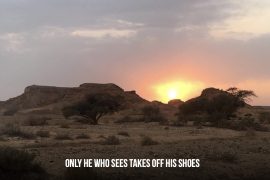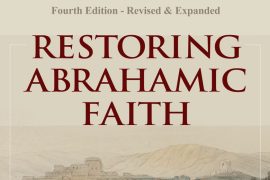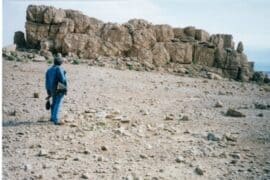If Genesis 1:1 is the best known verse in the Bible, and I think it well might be–even over John 3:16–isn’t it quite remarkable that it is mistranslated–and thus badly misinterpreted. This goes back centuries. I have a replica of the Geneva Bible, published in 1560, that was the standard up through the 17th century–even over the King James for a time. It reads:
In the beginning God created heaven and the earth.
And the venerable King James Version of 1611–held sacred by untold millions for centuries, reads:
In the beginning God created the heavens and the earth.
Most of my students, from all backgrounds, can quote this verse. I am sure many, if not all, of my blog readers can. The problem, of course, is that the translators have ignored an important element of grammar–the first word, בראשית/bereshit–is in the construct state, making it a temporal participle, connected to what follows. A good parallel is Jeremiah 26:1, which clearly means, “At the beginning of the reign of Jehoiakim . . .,” or “When Jehoiakim began to reign . . .” with what follows describing the state of things at such a beginning. Genesis 1:1-3 is clearly the same.
In other words it is not a simple declarative sentence about the creation of everything by God from nothing. It is rather a lead in to a description of the state of the “skies and the land” when God began to create things–bringing order out of the water covered earth that was without form and empty.
I well remember when the New English Bible was published in the 1960s when I was in college that its translation of this single verse cause great consternation on the part of traditional Bible readers. The “liberal scholars” were trying to water down the Creation Story, we were told. Everyone knew Genesis 1:1 was about the “origin of the universe,” to put it in modern terms.
Gradually other modern translations followed suit, including the Jewish Publication Society’s Tanakh: The Holy Scriptures (1985), and of course Fox, Alter, and others. Even the New Revised Standard Version, and its predecessor, the Revised Standard Version, included a variant note: “When God began to create the heavens and the earth…” The notes of the New English Translation (NET) Bible, hedge a bit, taking that first word as in the absolute state–but then in a note explaining that the construct state is nothing to get worried about–as if they prefer it but can’t bring themselves to put it in the text.
Translations have to sell, no matter how accurate they claim to be, and changing the first verse of the Bible is not a good marketing strategy–to say the least!
In the second episode of “Genesis Gleanings” we discuss this controversial issue and explore what a difference it makes in our understanding of the viewpoint of the chapter. In this new weekly series I go through my own translation, The Transparent English Bible: Book of Genesis with hosts Jono Vandor and Ross Nichols, and we cover the first eight verses of the chapter. You can listen or download here–and if you like what you hear, go back and try last weeks opening program, episode one: Gleanings from Genesis: Episode 2.
And you can preview and then get either a print or Kindle version of The Book of Genesis at this link. The “Buy” link takes you to Amazon where you make your choices and can look more inside.
If you get a copy be sure and join us next week. These programs are usually available each Thursday morning at truth2U.org.








Comments are closed.